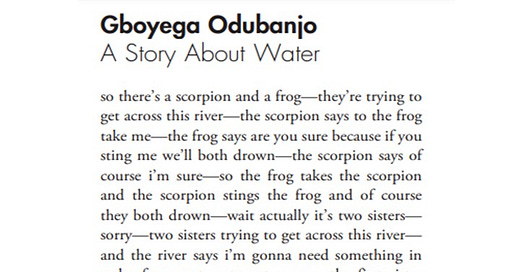"A Story About Water" by Gboyega Odubanjo
so the ocean fills the corridors stairs bedrooms the whole gaff—
Hi friends,
I know it’s mid-February but the new year is still lingering long in my mind’s eye. I’ve been thinking about origin stories and myth-making, and how we construct our sense of the self - in relation to others, in relation to the world…
“A Story About Water,” by the preternaturally talented Gboyega Odubanjo - who died, suddenly and tragically, last year - is rich with these notions. I love this poem because it’s packed to the gills (Biblical flooding, the folktale of the scorpion and the frog, race and place and the bounds of generosity) yet remains sparklingly readable, and never trite. That’s something remarkable about Odubanjo’s work, in general: the keenly articulated, often quite funny, voice that backbones each poem, scoops the reader in and holds us there.
Is anyone not familiar with the fable of the scorpion and the frog? I’ll tell it briefly anyway. The scorpion cannot swim, so it asks the frog to carry it across the river. The frog hesitates, saying he’s afraid the scorpion will sting him as they cross. The scorpion says, no, I wouldn’t sting you: we’d both drown if I did. The frog thinks this is sensible and so agrees. Halfway across the river, the scorpion - despite his assurances otherwise - does indeed sting the frog. Both animals are doomed. As the frog lays dying, he asks the scorpion: why did you sting me when you knew this would happen? The scorpion replies, ‘I’m sorry, but I couldn't resist the urge. It's my character.’
As climate allegories go, it’s almost too on-the-nose, right? The Earth a frog, carrying humankind on her back, and we persist in stinging her despite ourselves - it’s all very we are the virus. It’s a frustratingly myopic narrative, and one that I see often in white, Western-led climate spaces and conversations; it doesn’t allow breathing room for other - symbiotic, non-extractive, Indigenous - paradigms of engagement with the Earth. And so what I appreciate about this poem is that at each juncture where I think I’ve cracked it, or that it might be veering toward the prosaic, Odubanjo deftly shifts the terrain, winks in acknowledgement, pulls the rug. And the syntax of the poem is a masterclass in staying loose whilst harnessing propulsion. The overall effect becomes less an extended koan and more evocative of the strange logic of dreams: the way they twist and turn in ways that may initially seem incomprehensible on later retelling, but are proof of deeper subconscious preoccupations. Through it all, the poem gently writes into an awareness of the weirdness of world-building - how our sense-making myths often brush against one another, intersecting and branching off and overlapping and coming into and out of tension and coalescence.
Keep reading with a 7-day free trial
Subscribe to Field Guide to keep reading this post and get 7 days of free access to the full post archives.





